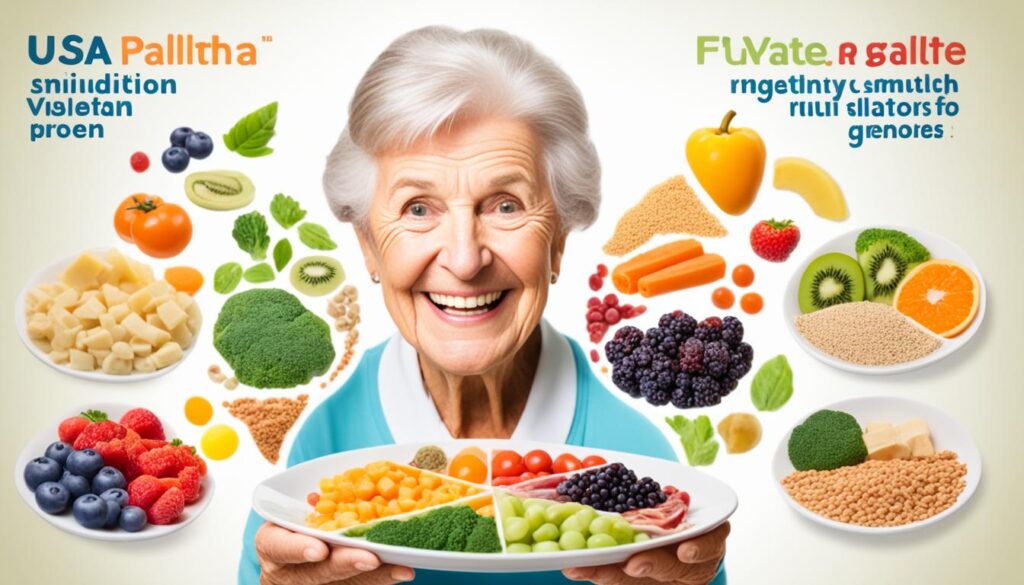Are you over 70 and wondering how to maintain a healthy diet? Navigating the unique nutritional needs of older adults can be challenging, but making simple adjustments to your eating habits can go a long way toward building a healthier lifestyle1.
As we age, our bodies undergo various changes that can impact our nutritional requirements. From changes in appetite and absorption efficiency to the need for increased protein and specific vitamins, it’s crucial to understand the importance of tailoring your diet to support healthy aging2.
Key Takeaways
- Older adults have unique nutritional needs, including higher protein intake and specific vitamin and mineral requirements.
- A balanced diet with a variety of fruits, vegetables, whole grains, and lean proteins can help maintain muscle mass and bone strength.
- Staying hydrated, limiting sodium and sugar intake, and incorporating physical activity are essential for overall health and well-being.
- Consulting a healthcare professional can provide personalized guidance on meeting your nutritional needs as you age.
- Overcoming challenges like reduced appetite or difficulty with meal preparation can help seniors maintain a healthy eating pattern.
The Importance of Healthy Eating for Older Adults
As we grow older, the importance of proper nutrition becomes increasingly vital. Maintaining a healthy diet can significantly impact the well-being of seniors, supporting brain function, heart health, bone strength, muscle tone, immunity, and overall mental and physical well-being3. Studies suggest that adhering to dietary patterns like the Mediterranean diet can improve cognitive function, processing speed, and mood in older adults3.
Why Nutrition Matters as You Age
As the body ages, its ability to absorb certain nutrients, maintain muscle mass, and regulate metabolism can change4. Seniors may need fewer calories to maintain a healthy weight, and poor appetite or unintentional weight loss can lead to malnutrition and health problems4. Additionally, older adults become more susceptible to chronic conditions like diabetes, high blood pressure, and osteoporosis, making proper nutrition even more crucial4.
Benefits of a Nutritious Diet for Seniors
A balanced, nutrient-rich diet can provide numerous benefits for older adults3. Studies have shown that adherence to dietary patterns like the Mediterranean diet and the DASH diet can be associated with less cognitive decline and a lower risk of Alzheimer’s disease3. Furthermore, the traditional Okinawan diet and caloric restriction have been linked to healthy aging3. Proper nutrition can also help maintain a healthy immune system, prevent food-borne illnesses, and support overall well-being4.
| Dietary Pattern | Benefits for Older Adults |
|---|---|
| Mediterranean Diet | Improved processing speed, mood, and cognitive function |
| DASH Diet | Positive impact on lowering blood pressure |
| Traditional Okinawan Diet | Linked to healthy aging |
Maintaining a healthy diet as we age can have a profound impact on our overall well-being, cognitive function, and longevity3. By making informed choices and incorporating nutrient-dense foods into our daily lives, seniors can enjoy the numerous benefits of a nutritious diet34.
Unique Nutritional Needs of People Over 70
As people age, their nutritional needs evolve. Older adults may need to focus on getting enough protein to maintain muscle mass and strength, as well as sufficient calcium and vitamin D to support bone health5. Additionally, the absorption of certain vitamins and minerals, such as vitamin B12, can become more challenging with age6.
Maintaining Muscle Mass and Bone Strength
Maintaining muscle mass and bone strength is crucial for older adults to retain their independence and mobility. Seniors should aim for around 0.8 grams of protein per kilogram of body weight daily to help preserve muscle mass7. Adequate intake of calcium and vitamin D is also essential, with the recommended dietary allowance for calcium increasing to 1,200 milligrams per day for women after age 505.
Getting Enough Vitamins and Minerals
As we age, the body’s ability to absorb certain vitamins and minerals can diminish. Roughly 20% of older adults don’t get enough vitamin B12, as it becomes harder for the body to absorb5. The recommended dietary allowance for vitamin D also increases from 600 International Units (IU) daily to 800 IU after age 705. Additionally, older adults are at risk of magnesium deficiency due to poor intake, medication use, and age-related changes in gut function6.
To meet their unique nutritional requirements, seniors should pay close attention to their intake of key nutrients like potassium, calcium, vitamin D, dietary fiber, and vitamin B127. By focusing on these essential vitamins and minerals, older adults can support their overall health and well-being.
“Malnutrition is common in older adults according to a study in Nutrients from August 2021.”7
It’s important for seniors to work with healthcare professionals to ensure they are meeting their unique nutritional needs and maintaining their overall health as they age.
Overcoming Challenges to Healthy Eating Over 70
As we age, various factors can make it more challenging to maintain a healthy diet. Medical conditions, medication side effects, and mobility issues can all impact appetite, food preparation, and nutrient absorption8. Additionally, life changes like the loss of a spouse can lead to loneliness, depression, and decreased interest in cooking and eating well8. Overcoming these obstacles requires a focused effort, such as planning meals in advance, finding ways to make cooking easier, and incorporating social connections into mealtimes.
Dealing with Medical Conditions and Medication Side Effects
Certain medical conditions and the medications used to treat them can significantly affect an older adult’s ability to eat well8. For example, changes in taste and smell due to aging or conditions like Parkinson’s disease can make food less appealing9. Dry mouth, a common side effect of many medications, can also make chewing and swallowing difficult8. Occupational therapists can provide custom splints, strengthening exercises, and kitchen adjustments to address physical challenges10. Additionally, regular dental check-ups are important to ensure dentures fit properly and don’t hinder eating10.
Staying Motivated and Engaged in Meal Planning
The loss of a spouse or other life changes can lead to loneliness, depression, and a decreased interest in cooking and eating8. This can be a significant barrier to maintaining a healthy diet. To stay motivated, seniors can try organizing communal meals with friends or family, which can provide social interaction and make mealtimes more enjoyable8. Additionally, resources such as cooking classes or meal delivery services can simplify the process of planning and preparing healthy meals10.
Strategies like varying the shape, color, and texture of food can also help make meals more appealing and encourage older adults to engage with their meals10. For those experiencing a loss of appetite due to aging or medication side effects, regular exercise can be a helpful tool to stimulate hunger9. If prolonged feelings of sadness or disinterest in eating persist, seeking professional help for depression is advised10.
By addressing the unique challenges faced by older adults and implementing practical solutions, seniors can overcome barriers to healthy eating and maintain a nutritious diet that supports their overall wellbeing8.
Healthy Eating Over 70: Essential Tips
As you grow older, maintaining a nutritious diet becomes increasingly important for your overall health and well-being. To ensure you’re getting the essential nutrients your body needs, here are some key tips for healthy eating over 70.
- Eat a Variety of Foods: Incorporate a wide range of foods from each food group, including fruits, vegetables, whole grains, lean proteins, and healthy fats. This ensures you’re getting a comprehensive array of essential vitamins, minerals, and fiber11.
- Limit Added Sugar, Saturated Fat, and Sodium: Keep an eye on your intake of added sugars, saturated fats, and sodium, as excessive amounts can contribute to various health issues. Opt for low-sodium, low-sugar, and heart-healthy alternatives whenever possible12.
- Get Enough Protein: Protein is crucial for maintaining muscle mass and strength as you age. Aim for about 46 grams of protein per day for women and 56 grams for men11.
- Add More Fruits and Vegetables: Focus on incorporating a variety of colorful fruits and vegetables into your diet. These nutrient-dense foods are packed with antioxidants, fiber, and essential vitamins and minerals.
- Stay Hydrated: Drink plenty of fluids, aiming for about six to eight glasses of water or other non-caffeinated beverages daily. Proper hydration is crucial for overall health and can help prevent dehydration, which is a common issue among older adults12.
In addition to these tips, be mindful of your vitamin B12 intake, as older adults may have difficulty absorbing this essential nutrient. Speak with your healthcare provider about any dietary supplements that may be beneficial for your specific needs.
Embracing a Mediterranean-style diet, which emphasizes plant-based foods, healthy fats, and lean proteins, can also be a great way to support your overall health and well-being1113. Additionally, staying physically active with about 2.5 hours of aerobic exercise per week can further improve your nutrition and fitness as you age11.
By following these essential tips, you can take control of your nutrition and make the most of your golden years. Remember, a balanced and nutritious diet, combined with an active lifestyle, can help you maintain your health, energy, and independence as you grow older111213.
Meal Planning and Preparation for Seniors
Meal planning and preparation can be a challenge for some older adults, but it’s an essential part of maintaining a healthy diet. When creating balanced menus for seniors, the focus should be on incorporating a variety of nutrient-dense foods that cater to their unique nutritional needs14. Studies show that elderly people tend to consume less protein than recommended for daily intake14. The USDA recommends daily amounts of important nutrients for the elderly, such as 65 grams of protein, 2-5 servings of fruits, 2-2.5 cups of vegetables, and 6-7 oz of whole grains14.
Creating a Balanced Menu
Designing a balanced menu for seniors involves considering their dietary restrictions and preferences14. Dietary restrictions for seniors can include issues with chewing and swallowing, requiring soft or pureed food14. Fruits and vegetables are low in calories, fat, salt, and sugar, reducing the risk of chronic diseases14. Good fats, such as monounsaturated and polyunsaturated fats, are necessary for energy and overall health, while avoiding saturated and trans fats14. Probiotics are essential for good gut health and nutrient absorption, found in foods like yogurt and kimchi.
Simplifying Cooking and Grocery Shopping
15 Engaging seniors in meal prep can provide assistance, company, and make them feel more invested in their meals15. Prepping versatile ingredients like quinoa and pre-chopped vegetables streamline meal preparation for the week15. Maintaining hydration is important for seniors, advised to take small sips throughout the day and keep a glass of water nearby15. Signs that seniors might need help with meal prep include spoiled food, an empty fridge, diminished energy, poor knife skills, burned pans, and leaving burners on.
15 Weekly meal planning helps avoid multiple trips to the grocery store during a busy work week15. Healthy breakfast ideas for seniors include warm oatmeal and berries, hard-boiled eggs with fruit, whole grain pancakes or waffles with nuts, yogurt parfait, power toast with nut butter, and poached egg on whole wheat toast15. Lunch suggestions for seniors emphasize loading up on colorful vegetables and substantial meals, such as quinoa salad, eggs with red potatoes, cottage fries with vegetables, Southwest omelet, and salmon wrap15. Dinner meal tips for seniors recommend lower calorie plans with intermittent fasting and high-fat options like baked or grilled Alaskan salmon, lamb and potatoes, shrimp and pasta, liver and fennel, beans and rice, shrimp with greens, and Southwest chicken salad15. Nutritional snack recommendations for seniors include high-fiber rye crisps with cheese or guacamole.
16 Seniors often have a reduced appetite, making it challenging to ensure they get enough nutrients16. 5 servings of fruits and vegetables per day are recommended for seniors16. Seniors should aim to consume at least 3 servings of whole grains per day16. Lean protein sources like poultry, fish, beans, and nuts are recommended with at least 3 servings per day16. Seniors should consume at least 3 servings of low-fat dairy products per day16. A soft diet meal plan is advisable for elderly individuals with difficulty chewing or swallowing16. Non-starchy vegetables like spinach and broccoli are recommended for seniors with diabetes16. Whole grains such as brown rice are preferred over refined grains for diabetic seniors16. Lean protein sources like chicken and fish are essential in a diabetic meal plan for seniors141516.
Dietary Guidelines and Food Patterns for Older Adults
Maintaining a healthy and balanced diet is crucial for older adults to meet their unique nutritional needs. The U.S. Department of Agriculture (USDA) has developed specific Food Patterns to guide seniors towards optimal nutrition17. These include the Healthy U.S.-Style Eating Pattern, the Healthy Mediterranean-Style Eating Pattern, and the Healthy Vegetarian Eating Pattern18.
The Healthy U.S.-Style Eating Pattern encourages a variety of vegetables, fruits, whole grains, fat-free or low-fat dairy, seafood, poultry, meat, eggs, nuts, seeds, and soy products18. In contrast, the Healthy Mediterranean-Style Eating Pattern contains more fruits and seafood and less dairy18. The Healthy Vegetarian Eating Pattern, on the other hand, excludes meat, poultry, or seafood but includes fat-free or low-fat dairy, soy products, eggs, beans and peas, nuts and seeds, and whole grains18.
Each of these USDA-recommended Food Patterns provides guidance on the types and amounts of foods from different food groups that seniors should aim to consume. Following these dietary guidelines can help older adults meet their unique nutritional needs and reduce the risk of chronic diseases such as high blood pressure, diabetes, hypertension, and heart disease17.
The USDA’s MyPlate Kitchen offers a wealth of resources for older adults, including healthy recipes, sample menus, and information on staying hydrated and reducing sodium intake18. Additionally, the MyPlate Plan helps individuals understand how much to eat from different food groups and how many calories are needed daily for energy maintenance17.
In summary, the USDA’s dietary guidelines and Food Patterns provide a roadmap for seniors to achieve optimal nutrition and maintain their overall health and well-being. By incorporating these recommendations into their daily lives, older adults can enjoy the benefits of a nutritious diet and reduce their risk of chronic conditions171819.

Staying Hydrated and Preventing Dehydration
Maintaining proper hydration is crucial for the health and well-being of older adults. As we age, our body’s ability to sense thirst can decrease, making it challenging to stay adequately hydrated20. Generally, the daily water requirement for seniors equals 7 to 8 cups or 1.5 Litres20. Older adults are at a higher risk of developing dehydration compared to the rest of the population, and factors like chronic illnesses, medication use, and incontinence can contribute to this2122. Dehydration can lead to a range of health problems, including urinary tract infections, respiratory issues, and even cognitive impairments20.
To prevent dehydration, seniors should aim to drink at least six 8-ounce glasses of water or other beverages per day, unless they are on a fluid-restricted diet20. Daily water consumption should equal a third of one’s body weight in pounds; for example, a 200-pound person should drink approximately 67 ounces of water daily20. Incorporating hydrating foods like fruits and vegetables, and limiting sugary or caffeinated drinks, can also help seniors stay well-hydrated20.
Simple strategies can make staying hydrated easier for older adults. Using a reusable water bottle with a straw can encourage frequent sips throughout the day21. Adding slices of lemon or orange to water can improve its taste and promote increased water consumption21. Taking small sips of water while eating, and enjoying soft, wet foods like yogurt and pureed fruit, can also contribute to meeting daily fluid intake requirements21. Socializing over a cup of tea with a friend can be an enjoyable way to ensure regular fluid intake21. However, it’s crucial to limit alcohol intake, as it does not contribute to daily fluid requirements and can further dehydrate the body21.
Maintaining proper hydration is essential for the overall health and well-being of older adults. By adopting these simple strategies and being mindful of their fluid intake, seniors can reduce the risk of dehydration and its associated health problems212220.
“Staying hydrated is crucial for older adults, as dehydration can lead to a host of health issues, from urinary tract infections to cognitive impairments. Promoting proper fluid intake should be a priority for caregivers and healthcare providers.”
| Hydration Tips for Seniors | Benefits of Staying Hydrated |
|---|---|
|
|
Food Safety Precautions for Seniors
As we age, our immune systems often become weaker, making us more susceptible to foodborne illnesses like Listeria and Salmonella23. Practicing proper food safety habits is crucial for older adults to avoid serious health issues. Here are some essential tips to reduce the risk of foodborne illness for people over 70:
- Pay close attention to expiration dates and discard any expired or spoiled foods24.
- Thoroughly cook meat, poultry, and eggs to the recommended safe internal temperatures. Avoid raw or undercooked seafood, which can harbor harmful bacteria24.
- Refrigerate leftovers promptly and reheat them thoroughly before serving24.
- Steer clear of unpasteurized dairy products, which may contain dangerous pathogens24.
- Wash your hands frequently with soap and water, especially before and after handling food24.
- Clean and disinfect kitchen surfaces, utensils, and cutting boards to prevent cross-contamination24.
By being mindful of food safety, older adults can reduce their risk of foodborne illness and enjoy nutritious meals without worry23. Staying vigilant about expiration dates, proper cooking, and good hygiene can help keep seniors safe and healthy.

Practicing safe food handling is crucial for older adults due to an increased risk of foodborne illness related to a decline in immune system function as they age23.
“Proper handwashing is key to avoiding foodborne illnesses.”24
While it may seem like a hassle, taking these simple food safety precautions can go a long way in protecting the health and well-being of older adults23. By prioritizing food safety, seniors can enjoy the many benefits of a nutritious diet and reduce their risk of serious health complications.
Incorporating Physical Activity for Better Health
Regular physical activity is just as essential as a healthy diet for maintaining overall well-being and vitality as we age25. For older adults, staying physically active can support brain function, balance, bone strength, and muscle tone25. The recommended goal is at least 150 minutes of moderate activity per week, along with muscle-strengthening exercises a few times a week26. Incorporating physical activity into the daily routine can help seniors stay strong, independent, and enjoy a better quality of life.
According to the World Health Organization, the global prevalence of physical inactivity is estimated to be around 31%, with older adults being more sedentary than younger adults, spending more than 9.4 hours in sedentary activities per day26. To combat this, the WHO recommends that individuals aged 65 and above should engage in at least 150 minutes of moderate-intensity aerobic physical activity or at least 75 minutes of vigorous-intensity aerobic physical activity weekly, along with muscle-strengthening activities and balance or multi-component exercises26.
Physical inactivity can have serious consequences, leading to higher mortality rates in high-income countries compared to conditions like hypertension, diabetes, or smoking26. That’s why it’s crucial for seniors to find ways to incorporate physical activity into their daily lives. Starting with light to moderate-intensity activities, such as walking, swimming, or dancing, can help reduce the risk of injury and gradually build up strength and endurance27.
To get started, the Move Your Way Activity Planner can provide valuable tips on fitting activity into daily routines27. By making physical activity a consistent part of their lifestyle, older adults can enjoy the many benefits, including improved brain function, better balance, stronger bones, and a higher quality of life.
“Regular physical activity is essential for maintaining health and independence as we age. Even small steps can make a big difference in improving overall well-being.”
| Activity Type | Recommended Frequency | Examples |
|---|---|---|
| Aerobic | 150 minutes per week of moderate-intensity or 75 minutes per week of vigorous-intensity | Walking, swimming, dancing, cycling |
| Muscle-Strengthening | At least 2 days per week | Resistance bands, weight machines, bodyweight exercises, gardening tasks |
| Balance | Incorporated into routine | Tai chi, yoga, balance exercises |
By following these guidelines and incorporating a variety of physical activities into their routine, older adults can enjoy the many benefits of an active lifestyle and improve their overall health and well-being272526.
Healthy Eating on a Budget for Older Adults
Maintaining a nutritious diet can be challenging for seniors on a fixed income. However, with some smart planning and savvy shopping strategies, older adults can enjoy affordable healthy eating without breaking the bank. Here are some tips to help save money on nutritious foods and create budget-friendly meal ideas for people over 70.
One key to affordable healthy eating for seniors is to focus on whole, unprocessed foods. Opt for items like frozen fruits and vegetables, canned beans and tuna, and inexpensive protein sources like eggs28. These nutrient-dense staples can form the foundation of many budget-friendly and nutritious meals.
Meal planning is another essential strategy for eating well on a limited budget. Take some time each week to plan out your meals and make a grocery list accordingly. This helps avoid impulse purchases and ensures you only buy what you need2.
Older adults can also take advantage of community resources like food pantries and meal delivery services to access affordable, healthy foods28. Additionally, be on the lookout for senior discounts at grocery stores and restaurants to stretch your budget even further.
- Stock up on frozen fruits and veggies, which are just as nutritious as fresh and often more cost-effective29.
- Incorporate beans, lentils, and other legumes into your meals for a budget-friendly protein boost2.
- Choose whole grains like brown rice, oats, and quinoa, which are filling and nutrient-dense29.
- Take advantage of senior-specific discounts and loyalty programs at your local grocery stores28.
- Meal prep and freeze extra portions to save time and money throughout the week2.
| Ingredient | Average Cost | Nutritional Benefits |
|---|---|---|
| Frozen Broccoli (16 oz) | $1.99 | High in fiber, vitamins C and K, and antioxidants29. |
| Canned Tuna (5 oz) | $1.29 | Packed with protein, omega-3 fatty acids, and essential minerals2. |
| Eggs (Dozen) | $2.50 | Excellent source of protein, vitamins, and minerals2. |
| Oats (18 oz) | $2.99 | Rich in fiber, complex carbohydrates, and beta-glucan29. |
By focusing on affordable healthy eating for seniors, older adults can maintain a balanced, nutrient-rich diet without straining their budget. With a little creativity and these budget-friendly tips, seniors can enjoy budget-friendly meal ideas that support their overall health and well-being.

“Eating well on a budget is possible with some planning and savvy shopping. The key is to focus on whole, nutrient-dense foods that provide the most bang for your buck.”
The Importance of Hydration for Older Adults
It’s also crucial for seniors to stay hydrated, as28 people in their 70s and older often drink less than the recommended 7 glasses of water per day2. Proper hydration can help older adults maintain cognitive function, prevent urinary tract infections, and minimize the risk of falls. Encouraging seniors to drink water throughout the day, and incorporating hydrating foods like soups and fruits, can help ensure they meet their daily fluid needs.
By incorporating these budget-friendly tips for healthy eating, older adults can enjoy a nutritious diet that supports their overall health and wellbeing without straining their finances28229.
The Role of Social Connections in Healthy Eating Over 70
Maintaining social connections is just as crucial for senior health as proper nutrition. Research shows that older adults who have strong social ties and engage in regular social activities experience significantly lower rates of cognitive decline, disability, and depression compared to those with limited social interaction30. Shared mealtimes can be an important source of this social engagement, providing opportunities for seniors to connect with friends, family, or their local community.
Eating together has been found to encourage older adults to put more effort into preparing and enjoying their food31. In fact, studies show that improved dietary-specific social support can mediate the positive effects of nutritional interventions on seniors’ fruit and vegetable intake31. By creating a more pleasant and uplifting dining experience, shared meals can make mealtimes more enjoyable and motivate seniors to maintain healthy eating habits.
- Organize regular group meals or potlucks in your community to foster social connections among older adults30.
- Encourage seniors to join a local mealtime program or community center that provides opportunities for shared meals32.
- Volunteer to help older adults with meal preparation or grocery shopping, which can also create a social bond30.
As we age, social connections become increasingly important for our overall health and well-being. By incorporating shared mealtimes into the lives of seniors, we can help improve their nutrition, cognitive function, and quality of life. Research suggests that public policies and community programs that foster social engagement among the elderly can have a significant positive impact on their health outcomes30.
“Shared meals can encourage older adults to put more effort into preparing and enjoying their food, making mealtimes more pleasant and uplifting.”
Seeking Professional Guidance for Personalized Nutrition
While general nutrition guidelines can be helpful, older adults often require personalized advice from healthcare professionals to address their unique health conditions, medications, and dietary needs33. Consulting with a doctor, registered dietitian, or other qualified healthcare provider can ensure seniors receive the tailored guidance they need to develop a nutritious eating plan that supports their overall well-being33. These professionals can also help older adults overcome specific challenges to healthy eating and monitor their progress over time.
As the population of older adults continues to grow, the importance of personalized nutrition advice for this demographic becomes increasingly clear34. One in every eight people in America is considered an older adult, defined by the Older Americans Act (OAA) as an individual aged 60 years or older34. By 2030, it is projected that about 72.1 million older persons will represent 19.3% of the population in the U.S34. With an aging population, healthcare providers play a crucial role in ensuring seniors receive the tailored nutrition guidance they need to maintain their health and independence.
Consulting healthcare providers for senior nutrition is essential, as older adults may face unique challenges that require specialized attention33. For example, aging can put individuals at an increased risk for dehydration, and limiting salt consumption and choosing foods low in sodium or with no added salt is advised for older adults33. Additionally, an older adult’s diet should focus on getting enough fiber, healthy fats, reducing cholesterol and fat intake, and staying hydrated33. Doctors and registered dietitians can help seniors navigate these specific dietary needs and develop a personalized plan that addresses their health concerns.
Personalized nutrition advice for older adults can also help prevent or manage chronic conditions34. Almost 80% of older adults have one chronic condition, and half have two or more34. Consulting with healthcare providers can ensure seniors’ diets support the management of these conditions and promote overall well-being33. Changes in appetite and weight in older adults should also prompt a visit to a doctor before making dietary changes, as these could be signs of an underlying health issue33.
By seeking professional guidance for personalized nutrition, older adults can take proactive steps to maintain their health and independence as they age33. Collaboration with healthcare providers can help seniors develop a nutritious eating plan that addresses their unique needs and supports their overall quality of life33.
“Personalized nutrition advice is essential for older adults, as their dietary needs can differ significantly from those of younger individuals. Working closely with healthcare providers ensures seniors receive the tailored guidance they need to maintain their health and well-being.”
| Dietary Recommendations for Older Adults | Rationale |
|---|---|
| Limit soft cheeses, raw or undercooked meat and seafood, and unpasteurized milk products | Older adults can be more at risk for foodborne illnesses, like Listeria and Salmonella33. |
| Drink six 8-ounce glasses of water or other beverages daily | It is recommended for older adults to stay hydrated33. |
| Focus on foods high in vitamin D, such as fatty fish, canned tuna, egg yolks, fortified milk and cereal, or supplements | Vitamin D is essential for bone health and can be challenging for older adults to obtain from diet alone33. |
By consulting healthcare providers for personalized nutrition advice, older adults can take proactive steps to maintain their health and independence as they age33. These professionals can help seniors develop a nutritious eating plan that addresses their unique needs and supports their overall well-being33.
Conclusion
Maintaining a healthy diet is essential for older adults, as it can support brain function, heart health, bone strength, muscle mass, and overall well-being35. By understanding their unique nutritional needs, overcoming common challenges, and following personalized guidance from healthcare providers, seniors can incorporate nutritious foods and stay hydrated to enjoy a high quality of life3536.,
With a focus on balanced meals, physical activity, and social connections, older adults can prioritize their health through sustainable, lifelong healthy eating habits37. Incorporating key nutrients like protein, omega-3 fatty acids, and dietary fiber can help mitigate age-related issues such as muscle loss, cognitive decline, and cardiovascular concerns3537.,
By summarizing the importance of nutrition for older adults, highlighting the key takeaways for maintaining a healthy diet over 70, and providing a comprehensive overview of the tips discussed throughout this article, seniors can feel empowered to make informed choices and take proactive steps towards their well-being353637.,,
FAQ
What are the key benefits of healthy eating for older adults?
Eating healthfully and maintaining an active lifestyle can support brain function, heart health, bone strength, muscle tone, immunity, and overall mental well-being for seniors.
How do the nutritional needs of older adults differ from younger adults?
As people age, their bodies may have a harder time absorbing certain nutrients like vitamin B12. Older adults also need to focus on getting enough protein, calcium, and vitamin D to maintain muscle mass and bone health.
What are some common challenges to healthy eating for seniors?
Medical conditions, medication side effects, mobility issues, loneliness, and depression can all make it harder for older adults to shop, cook, and maintain a balanced diet.
What are the key tips for healthy eating over 70?
Eating a variety of foods, limiting added sugar and sodium, getting enough protein, staying hydrated, and incorporating fruits and vegetables are all important for senior nutrition.
How can older adults make meal planning and preparation easier?
Strategies like using pre-cut produce, finding simple recipes, utilizing meal delivery services, and involving family and friends can simplify the cooking process for seniors.
What dietary guidelines and food patterns are recommended for older adults?
The USDA has developed specific Healthy Eating Patterns to help seniors meet their unique nutritional needs, including the Healthy U.S.-Style, Mediterranean-Style, and Vegetarian Eating Patterns.
Why is staying hydrated so important for older adults?
The body’s ability to sense thirst can decrease with age, making seniors more susceptible to dehydration. Drinking at least six 8-ounce glasses of water or other fluids per day is crucial for senior health.
How can older adults incorporate physical activity into their daily routine?
The recommended goal for older adults is at least 150 minutes of moderate physical activity per week, along with muscle-strengthening exercises a few times a week, to support overall health and well-being.
What are some budget-friendly healthy eating tips for seniors?
Buying frozen fruits and vegetables, canned beans and tuna, eggs, and taking advantage of senior discounts can help older adults access nutritious foods without breaking the bank.
How can social connections impact healthy eating for older adults?
Sharing meals with friends, family, or in a community setting can make mealtimes more enjoyable and encourage seniors to put more effort into their food, which is crucial for their health and well-being.
When should older adults seek professional guidance for their nutrition?
Speaking with a doctor, registered dietitian, or other qualified healthcare provider can ensure seniors receive personalized advice to address their unique health conditions, medications, and dietary needs.
Source Links
- Nutrition Over 70: A Guide To Senior Dietary Needs
- Healthy diet tips for ageing well
- Healthy Diet for Healthy Aging
- Healthy Eating for Seniors
- Nutrition Guidelines for Older Adults
- How Your Nutritional Needs Change as You Age
- Older Adults Should Follow These Nutritional Guidelines for Healthy Aging | Livestrong.com
- Nutrition for Older Adults: MedlinePlus
- Eating Well as You Age – HelpGuide.org
- Overcoming Roadblocks to Healthy Eating
- Nutrition and Fitness After 70: How to Meet Your Needs
- Healthy eating for older adults
- 7-Day Meal Plan for Healthy Aging from the Inside-Out, Created by a Dietitian
- Meal Ideas for Seniors: 7-day Meal Plan for Elderly Samples
- 18 quick, easy meal preparation ideas for seniors
- 7-Day Meal Plan for Elderly
- USDA MyPlate Nutrition Information for Older Adults
- Healthy Meal Planning: Tips for Older Adults
- Nutrition as We Age: Healthy Eating with the Dietary Guidelines – News & Events
- How to avoid dehydration in the over 70’s
- Tips for Water Intake for Older Adults
- Hydration Status in Older Adults: Current Knowledge and Future Challenges
- Nutrition as We Age: Healthy Eating with the Dietary Guidelines – News & Events
- Healthy Eating over 70 : USDA ARS
- What Do We Know About Healthy Aging?
- Promoting physical activity and a healthy active lifestyle in community-dwelling older adults: a design thinking approach for the development of a mobile health application
- Physical Activity for Older Adults
- 10 Budget-Friendly, Healthy Eating Tips for Seniors – Grand Oaks
- 20 Nutritious and Easy Recipes for Senior Nutrition
- How Social Connections Keep Seniors Healthy
- The role of improved social support for healthy eating in a lifestyle intervention: Texercise Select
- Eating Alone or Together among Community-Living Older People—A Scoping Review
- Nutrition for Older Adults: Why Eating Well Matters as You Age
- Position of the Academy of Nutrition and Dietetics: Food and Nutrition for Older Adults: Promoting Health and Wellness
- Nutrition Concerns for Aging Populations – Providing Healthy and Safe Foods As We Age
- Nutritional Interventions for Elderly and Considerations for the Development of Geriatric Foods
- Should older adults eat nuts? In a nutshell, yes.


